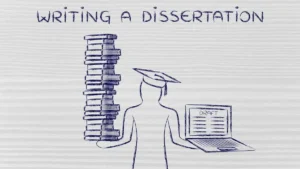Writing a dissertation can be an intimidating task for many students. It’s a significant milestone in your academic journey, and the thought of it can feel overwhelming. However, fear not! With the right approach, careful planning, and effective strategies, you can conquer this academic challenge successfully.
In this comprehensive guide, our aim is to address the common problems and uncertainties that students face when embarking on their dissertation journey. Whether you’re a graduate student about to dive into the world of dissertation writing or an undergraduate student preparing for this substantial undertaking, we understand your concerns. Our mission is to provide you with the knowledge and insights you need to tackle your dissertation project with confidence.
Throughout the following sections, we will break down the entire dissertation writing process, offering valuable tips, highlighting pitfalls to avoid, and providing answers to the questions that often arise. You don’t have to go through this journey alone. Let’s embark on this adventure together, armed with the tools and information you need to succeed in your dissertation writing. And if you ever find yourself needing extra assistance, remember that dissertation writing services are also available to support you in this endeavor.
Dissertation Writing: A Brief

A dissertation is a comprehensive and lengthy academic document that serves as a culmination of a student’s research and scholarly work within a specific field of study. It is typically required for advanced degrees, such as a master’s or a doctoral degree.
Dissertations are characterized by their in-depth research, original contributions to the chosen field, and their structured and formal nature.
Step-By-Step Process To Write a Dissertation
Before delving into the nuts and bolts of writing a dissertation, it’s crucial to have a clear understanding of the process itself. A dissertation is a long-form research project that demonstrates your ability to conduct independent research, analyze data, and contribute to your field of study. Here’s a brief overview of the key steps involved:
-
Choosing a Topic:
Selecting the right research topic is the foundational step in your dissertation journey. It’s essential that you choose a topic that not only aligns with your academic field but also genuinely interests you. Here’s why this matters:
- Personal Interest: When you are passionate about your research topic, you are more likely to stay motivated throughout the lengthy dissertation process. Your enthusiasm will drive you to explore the subject thoroughly and persevere through challenges.
- Relevance: Your chosen topic should also be relevant to your field of study. It should address a specific research gap or question that contributes to the existing knowledge in your discipline. This ensures that your dissertation is not just an academic exercise but a valuable addition to your field.
-
Literature Review:
The literature review is a critical component of your dissertation that involves examining the body of existing research related to your chosen topic. Here’s why it’s important:
- Contextualizing Your Research: By reviewing the literature, you gain an understanding of the current state of knowledge in your field. This context helps you identify what has already been studied and what gaps or unanswered questions exist.
- Identifying Research Gaps: Through your literature review, you can pinpoint areas where previous research falls short or where further investigation is needed. This sets the stage for your research objectives.
-
Research Proposal:
Your research proposal is a detailed plan that outlines the scope, objectives, methodology, and expected outcomes of your dissertation research. Here’s why it’s a crucial step:
- Clarity and Structure: Developing a well-structured research proposal forces you to clarify your research goals and methods. This clarity is not only beneficial for you but also for your advisor and committee, as it provides a roadmap for your dissertation.
- Ethical Considerations: The research proposal often includes ethical considerations related to data collection and participant consent, ensuring that your research is conducted ethically and responsibly.
- Feasibility Assessment: Creating a research proposal allows you to assess the feasibility of your project. You can identify potential challenges and plan how to address them, reducing the likelihood of unforeseen obstacles during the research process.
-
Data Collection:
Data collection is a pivotal stage in the dissertation process, where you gather the information needed to address your research questions or hypotheses. This involves:
- Selecting Research Methods: Choose the most suitable research methods for your study. These can include surveys, interviews, experiments, observations, content analysis, or a combination of methods. The choice depends on your research objectives and the nature of your topic.
- Creating Data Collection Tools: Develop questionnaires, interview protocols, or other instruments required to collect data. Ensure that these tools are designed to yield valid and reliable results.
- Ethical Considerations: If your research involves human subjects, it’s essential to adhere to ethical guidelines. Obtain informed consent from participants, protect their privacy, and address any potential risks.
- Data Management: Organize and store your collected data systematically to ensure its security and accessibility for analysis. Data management is critical to maintain the integrity of your research.
-
Data Analysis:
Once you have gathered your data, the next step is to analyze it to draw meaningful conclusions. This involves:
- Data Cleaning: Review and clean your data to identify and correct any errors or inconsistencies. Clean data ensures the reliability and accuracy of your findings.
- Data Interpretation: Utilize appropriate statistical or qualitative analysis techniques to examine your data. Interpretation involves looking for patterns, relationships, or trends within the data.
- Drawing Conclusions: Based on your analysis, draw well-supported conclusions that address your research objectives. Your conclusions should align with your initial hypotheses or research questions.
-
Writing and Editing:
When writing your dissertation, it’s vital to present your research, findings, and analysis with clarity and academic rigor. Here’s what this entails:
- Structure and Organization: Follow the structure outlined in your research proposal and adhere to your institution’s formatting guidelines. Ensure that your dissertation flows logically from one section to the next.
- Clarity and Precision: Write in a clear and precise manner, avoiding jargon or overly complex language. Your goal is to communicate your research effectively to your target audience.
- Revision and Editing: Revise your work meticulously, checking for grammar, spelling, and typographical errors. Editing is a crucial step to ensure the overall quality of your dissertation.
-
Citation and References:
The significance of proper citation and referencing in academic writing, particularly in acknowledging the sources that have contributed to your research, cannot be overstated.
- Citation Styles: Follow a recognized citation style (e.g., APA, MLA, Chicago) consistently throughout your dissertation. Properly cite all sources, including literature, data, and any other referenced materials.
- Reference Management: Use reference management software to organize and format your citations and references accurately. This helps maintain consistency and saves time during the writing process.
- Comprehensive References: Compile a comprehensive list of references at the end of your dissertation, listing all the sources you’ve cited. Ensure that this section adheres to your chosen citation style’s guidelines.
Tips for Writing a Dissertation:
Now that you have a grasp of the dissertation process, let’s dive into some practical tips to help you succeed in writing your dissertation:
- Start Early: Begin your dissertation as soon as possible to allow ample time for research, writing, and revisions.
- Set Clear Goals: Define your research objectives and hypotheses at the outset to maintain focus throughout the project.
- Organize Your Research: Create a detailed outline to help structure your dissertation logically.
- Consult Your Advisor: Regularly communicate with your advisor for guidance and feedback.
- Stay Consistent: Follow a consistent writing schedule to make steady progress.
- Proofread and Edit: Carefully proofread and edit your work to eliminate errors and improve clarity.
- Seek Peer Feedback: Share your work with peers or mentors to gain valuable insights.
- Use Citation Tools: Utilize citation management software to keep track of your references.
- Avoid Plagiarism: Always attribute sources properly and avoid plagiarism at all costs.
- Stay Persistent: Dissertation writing can be challenging, but persistence is key. Keep your motivation high and push through difficult moments.
[Also Check Out: List of 200+Dissertation Topics]
Things to Avoid While Writing a Dissertation
In addition to knowing what to do, it’s equally important to be aware of common pitfalls to avoid during the dissertation writing process:
- Procrastination: Waiting until the last minute can lead to stress and subpar work.
- Lack of Planning: Failing to create a comprehensive plan can result in disorganized research and writing.
- Ignoring Feedback: Disregarding feedback from advisors and peers can hinder your progress.
- Overcomplicating: Keep your research questions and methodology clear and concise.
- Neglecting Self-Care: Don’t forget to take breaks and prioritize your mental and physical well-being.
- Inadequate Citations: Properly cite all sources to avoid plagiarism and maintain academic integrity.
- Excessive Jargon: Avoid using overly technical language that may alienate readers.
- Wordiness: Keep your writing concise and to the point; avoid unnecessary verbosity.
- Ignoring Formatting Guidelines: Adhere to your institution’s formatting guidelines meticulously.
- Rushing the Conclusion: Give ample thought to your conclusion; it should provide a satisfying closure to your research.

Frequently Asked Questions (FAQs)
Q1: How long should a dissertation be?
A: Dissertation length can vary, but it typically ranges from 10,000 to 15,000 words for undergraduate dissertations and significantly longer for graduate-level work.
Q2: How do I choose a dissertation topic?
A: Choose a topic that genuinely interests you and aligns with your field of study. Consult with your advisor for guidance.
Q3: What’s the best way to structure a dissertation?
A: Common structures include an introduction, literature review, methodology, results, discussion, and conclusion. However, consult your institution’s guidelines for specific requirements.
Q4: Can I use the first person in my dissertation?
A: It depends on your institution’s guidelines and your field of study. Some disciplines allow first-person pronouns, while others prefer a more formal, third-person style.
Q5: How can I manage dissertation stress?
A: Maintain a balanced schedule, seek support from peers and advisors, and practice stress-relief techniques such as meditation or exercise.
Conclusion:
Writing a dissertation is a challenging but rewarding endeavor that showcases your research skills and academic dedication. By following the tips provided in this guide and avoiding common pitfalls, you can increase your chances of success. Remember to start early, stay organized, seek guidance when needed, and take care of your well-being throughout the process. With diligence and perseverance, you can confidently embark on your dissertation journey and contribute meaningfully to your field of study. Good luck!



